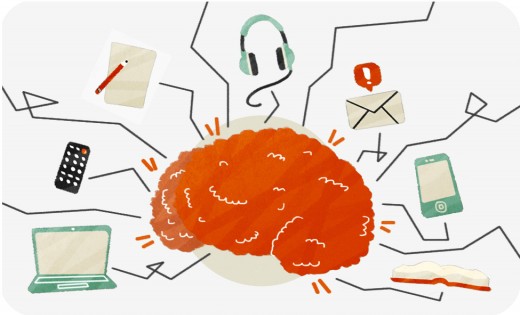Thank God if You are not a Multi-tasker!

If you envy multi-taskers because you are not one, you will be happy to read this. The new research has shown that multitasking not only reduces productivity, but it also causes damage to our brain.
Until today, it was being thought that multitasking is good and shows the capability of a person to do many things at a time, proving him or her smart and intelligent. However, recent studies reveal something just the opposite.
The previous thought that multitasking increases productivity was because of the simple logic that if you are doing many things at the same time, you are bound to achieve more! However, recent studies have demonstrated that switching fast from one task to the other affects work and productivity in a seriously negative way. Multi-taskers face more problems in tuning out distractions than people who concentrate on one task at a time. Above that, doing many different tasks at once can in fact impair cognitive skills.
The Challenges of Multitasking - The Ellen Show
What does multitasking actually mean?
First let us consider how we define multitasking. We can define it as doing two or more tasks at a time or it can also mean switching from one task to another back and forth. Multitasking also can be defined as performing several tasks in swift succession.

What do studies suggest?
Psychologists asked participants to change tasks and measured how much time it took to shifting. The study conducted by Stephen Monsell and Robert Rogers, showed that participants became slower when they switched tasks than when they repeatedly did the same task.
One more study conducted by Joshua Rubinstein, David Meyer and Jeffrey Evans in 2001 showed that participants lost considerable amounts of time when they switched between several tasks and lost still more time when the tasks became more complicated.
Still one more study of 2009 done by Clifford Nass showed that when 262 college students were challenged to complete experiments which involved switching tasks, filtering irrelevant information and utilizing working memory, the results were just the opposite of what Nass had thought. Nass had thought that multitaskers would outperform non-multitaskers, at least in some tasks. But multitaskers proved very bad at all the three tasks! Even scarier was the fact that only one experiment involved actual multitasking, indicating that even when they concentrate on a single task, multitaskers used their brains less efficiently.
Another 2010 study done by the neuroscientists of Inserm – the French medical research agency – showed that when there is a focus on two different tasks, each side of the brain is engaged in a different task. This indicates a two-task limit of human brain. And if more tasks are taken up, chances of errors still increase.

What do the studies on multitasking mean?
Multitasking is managed in the brain by what are called mental executive functions. These mental executive functions organize and control cognitive processes and decide when, how and in what order the tasks are to be performed. The study done by Rubinstein, Evans and Meyer shows that there are two steps to the executive control process. The first step is called “goal shifting” which means to do a thing instead of another and the second is called “role activation” which means changing the rules for the first task to those of the new task.
This switching may add a time cost of just some fractions of a second, but this may go on adding up when people start switching back and forth constantly. This may not make that big difference in some situations, like when you are watching TV and at the same time ironing clothes. But when productivity and safety are concerned, even fractions of seconds may make a huge difference, like while driving a car.
How to apply the research practically?
Meyer’s studies show that productivity is decreased as much as by 40% by the mental blocks formed when people shift from tasks. Now as you know this harmful impact of multitasking, you can use this knowledge to work for increasing your productivity.
Of course, situation is not the same all the time. E.g. if you are texting your friend, while watching a football match, it doesn’t make a big harm. However, if you try to talk on phone while driving on a road with heavy traffic, a fraction of a second and your mental block can make it a matter of life and death.
Nass suggests what he names 20-minute rule. According to this, instead of switching chores from minute to minute, dedicate a 20-minute slice of time to one single task, and then switch to the other.

Multitasking causes stress
Inspired by a factual observation that an average professional spends around 23% of the day on emailing, University of California’s Gloria Mark and her colleague, Stephen Voida got into an office, kept 13 employees away from emailing for five days, tied heart monitors to their chest and tracked their computer usage. It was seen, as expected, that employees were less stressed while being cut off from emailing. They concentrated on one task for a longer time and changed screen less often, thus minimized multitasking.
Thus henceforth if you see a multi-tasker, don’t envy him or her because you cannot do it, but thank God that you are not a multi-tasker!





